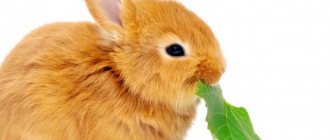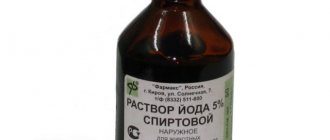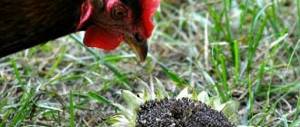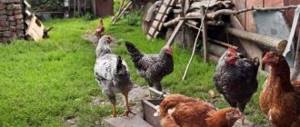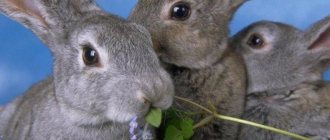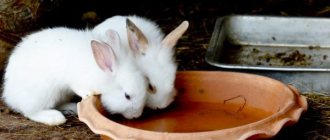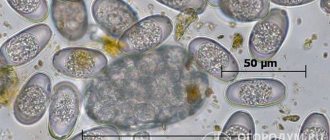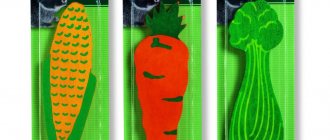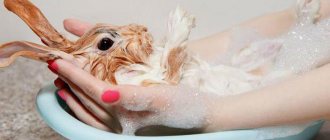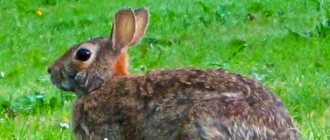Is it possible to give rabbits fresh cucumbers and their tops?
Experts are confident that cucumbers do not harm the health of rabbits. However, you should not immediately switch the animal to a diet consisting exclusively of this vegetable. It should be a supplement to the daily diet. Herbivores are especially susceptible to various digestive diseases, so it is important to approach their diet with caution - not all food will be beneficial.
Important! Cucumbers purchased in stores are not suitable for feeding rabbits. They may contain chemical elements that promote long-term storage. They are also often sprayed against pests. Excess of harmful substances and toxins can cause allergies.
Cucumber contains water, carbohydrates, beneficial macro- and microelements, as well as vitamins (water-soluble and fat-soluble). It is also low-calorie: 100 grams of vegetable contains only 14 kcal.
Rabbit eats cucumber
Since cucumbers contain little fiber, they cannot be considered an essential food. In addition, they are not suitable for feeding herbivores. In the case of commercial species of rabbits, it is rational to replace the vegetable with water. Decorative species living at home receive the most benefit from this product. Cucumber supplements are also suitable for breeding breeds, for which it is important to have a balanced diet. They do not allow you to gain excess weight, while they are rich in vitamins and microelements. However, if you overuse the cucumber mixture, you may experience gastrointestinal upset and food poisoning.
Attention! Cucumber tops are not suitable for feeding. These plants are not nutritious food.
In addition, animals do not like the presence of small thorns on the leaves and stems. Plants are often sprayed with chemicals and growth stimulants. Toxins that come into contact with plants can poison pets. The nature of the poisoning will depend on the type of poison with which the plant was treated.
Cucumber in the diet of rabbits
Cucumber is very common in farms and gardens. For this reason, many are tempted to feed it to rabbits. There are differing opinions as to whether this can be done. Some feed without a doubt, others refuse and say that it is harmful. Where is the truth?
The thing is, fresh organic cucumbers will not harm the animal. It is important not to buy from a store where they have been repeatedly treated with chemical additives for better storage and sprinkled during cultivation. Even people can develop allergies from such vegetables, not to mention small animals. Someone could get burned on such products and draw a conclusion for themselves.
Even if all the cucumbers are grown in your own garden, do not rush to fill the rabbits with them. If they have never tried this dish before, give it just a little and monitor your pet's health. Include in the diet provided that the behavior has not changed. Sometimes lethargy and loose stools appear after consumption; in this case, in order not to harm the intestines, do not give the vegetable anymore.
Read also: How to sow carrots so as not to thin out later: the best methods for summer residents
Although cucumber is mostly water, it contains trace elements, carbohydrates and vitamins. It is recommended to include it regularly in the diet, provided that the rabbit digests it well. But you shouldn’t go to extremes by feeding only cucumbers. It is best to give everything at once, or grate various foods and mix with chopped herbs. All rabbits love these salads very much.
How much cucumber should you give your rabbit?
It is necessary to introduce a new product into the rabbit’s diet gradually, little by little, and immediately monitor how its use affects the pet’s condition. If the animal's behavior has not changed, you can continue to introduce cucumber supplements into its diet.
You need to introduce a new product into your diet gradually
Can rabbits be given bread?
Different species of eared animals may react differently to the same product. If there is a disturbance in the functioning of the gastrointestinal tract, you must stop eating the vegetable. Herbivores are fed three times a day; cucumber mixture is best given at lunchtime.
Important! It is also worth canceling the introduction of the product if the animal has become lethargic and apathetic.
Is it possible to give rabbits potatoes?
Potatoes are useful because they contain vitamins and minerals that the body needs
What is important is what part and in what form is fed to the animal. Below are the properties of each variation.
Raw
It is worth remembering that the root vegetable is rich in starch, which in its original form is poorly absorbed, causing dysfunction of the gastrointestinal tract, so it should be excluded from the diet of young animals under 4 months of age, as well as females during lactation (to avoid blockage of the milk ducts) .
For other groups of animals, the share of potatoes should not exceed 10% of the total amount
Before serving, it is important to wash the potatoes, remove sprouts and cut them into small pieces. When introducing a vegetable into a rabbit’s daily menu, it is important to monitor its condition.
Any deviations from the norm indicate individual intolerance to potatoes. It is completely excluded from the diet. It is recommended to accustom them gradually; rabbits respond better to root vegetables in winter, in the absence of a large amount of fresh food.
Boiled
After undergoing heat treatment, potatoes are considered a complete component of the diet. In this form, the starch contained in the vegetable is easily digested, contributing to the gain of live weight. Based on this, the portion of root vegetables is calculated according to the activity of the animal: for cage housing without walking - no more than 50-70 g/day (if rabbits move a lot, the dose can be increased to 80-100 g/day).
There are also no restrictions for age and gender groups; it is suitable for both baby rabbits and pregnant females. The water in which potatoes were boiled should absolutely not be used; during heat treatment, all the harmful substances of the vegetable pass into the liquid. Limit the consumption of boiled potatoes for breeding animals at least a week before mating. The calorie content of root crops and, as a result, weight gain, negatively affect the reproductive function of animals.
Potato tops
It is not recommended to feed the green part of the vegetable to rabbits, as it accumulates harmful substances after spraying with chemicals. Tops and potato sprouts contain solanine, which causes intoxication of the body. It should be completely excluded from the diet to prevent poisoning and death of the livestock.
Did you know? Solanine was discovered in 1820. For potatoes, it has a protective function against insects and fungal infections of plants.
Potato peeling
As for potato waste, it is added to the diet of rabbits both raw and boiled.
When using cleaning, keep the following in mind:
- you need to wash the cleaning thoroughly;
- Do not peel unripe, frozen or rotten vegetables.
How to prepare a cucumber for feeding
Can rabbits be given dill?
There are several ways to serve cucumbers. For example, herbivores love salad, for the preparation of which vegetables are first grated and then mixed with other food. The vegetable can also be served cut into small pieces. Fluffies also like the combination of the supplement with various herbs, vegetables and root vegetables.
The ratio of the product and other food for decorative rabbits should be 20%; for productive breeds this figure is at 15%. The daily intake of vegetables for decorative breeds is 50 grams; productive rabbits can consume up to 100 grams per day. An hour after feeding, it is necessary to remove uneaten pieces from the feeder. Because when they sour, they become dangerous for pets.
You can grate cucumber for rabbits
Herbivores should not be given wet fresh cucumbers - this can kill them. Like any herb, vegetables are first well dried before feeding. It is also worth noting that animals are not allowed to eat spoiled or dirty gherkins.
Feeding rules
Despite the usefulness of the green part of the crop, it cannot be given to rabbits in large portions. It contains organic acids - nicotinic, pantothenic, oxalic, and essential oils, which can cause digestive upset.
Preparing tops for a rabbit
The above-ground part of the root crop should be introduced gradually into the diet of rabbits. It is not offered to rabbits under two months of age, because their digestive system is too sensitive. After weaning, young animals can be given greens in small portions, mixed with other herbs - plantain, dandelion, burdock, nettle.
Grass and tops are given to rabbits in their pure form. First, it is washed with water to remove dust, and then placed in the air under a canopy. Dried greens contain less essential oils and acids, which means they are better absorbed and do not cause digestive problems. Greens are never collected and distributed to pets at dawn, when there is dew on the leaves. Eating wet grass provokes fermentation processes in the intestines. For the same reason, rodents are not fed grass after rain.
Carrot tops are harvested for the winter and included in hay. The collected greens are dried in the shade for several days, spread in a thin layer on a clean cloth or paper. The blanks are stored in paper or canvas bags in a well-ventilated area.
Carrot tops can be given to rabbits starting from two months, including them in herbal mixtures. The above-ground part of the plant contains protein, vitamins and microelements necessary to maintain the health of pets. These greens are not offered in large portions, so as not to provoke intestinal upset.
Since childhood, all cartoons and fairy tales show us how a rabbit eats carrots, thereby instilling in us that this is his favorite product. Indeed, for an animal to have beautiful shiny fur and good health, its diet must be rich in vitamin A, which is contained in large quantities in this orange vegetable.
Rabbit breeding describes that the main rule of keeping rabbits is a varied diet. It is also known that in agriculture, carrot tops are waste. Let's figure out why carrots are useful for animals, and whether it is possible to feed their ground part to rabbits.
At what age can cucumber supplements be added?
Fresh cucumbers can be added to the diet of decorative rabbits immediately after switching to plant foods. The change in diet should occur gradually. Productive breeds can add cucumber mixture to their food only after the fattening period has ended.
Is it possible to give zucchini to rabbits?
For the first time, fresh cucumbers can be given to pets only after 4 months of life. By this period, their body becomes more stable and is able to digest heavier foods. This rule applies to both decorative and production breeds.
Attention! Rabbits should not be given cucumber mixture, as they are not yet able to digest this product. It is worth paying special attention to the nutrition of animals during weaning from mother's milk.
The nutritional value
Cucumbers are low in calories. 100 grams of product contain only 14 kcal, proteins - 0.82 grams, carbohydrates - 2.49 grams, fats - 0.11 grams. But there is a lot of moisture. In a cucumber weighing 100 grams, 95 grams are water and some fiber. The vitamin composition is approximately the same as in other succulent foods.
Cucumbers contain many vitamins:
- Water-soluble vitamins, group B (nicotinic acid, B1, B2, B5, PP and others)
- Fat-soluble vitamins (trace)
- Macro- and microelements (sodium, potassium, calcium, phosphorus, iron, manganese).
Since cucumbers are low in fiber, they cannot be considered an essential food for rabbits. Moreover, food poisoning from cucumbers is possible when given an excess amount of this vegetable. Poisoning manifests itself in diarrhea, disruption of an important part of digestion (cecotrophy) - a modified form of coprophagia.
Is it possible to give pickled cucumber to rabbits?
Some use weak solutions of lactic acid to improve the digestion of animals. These compounds are found in small doses in pickled foods. However, such cucumbers are not suitable for feeding herbivores. This rule applies even to lightly pickled vegetables. They contain substances that, when combined with food and food additives, lead to intoxication and death.
40% lactic acid
To improve digestion, it is better to purchase 40% lactic acid, which in appearance resembles a thick syrup. This supplement will allow food to be digested quickly and will also alleviate the side effects of eating roughage. It also increases sexual activity and promotes pregnancy in rabbits. This solution is also used to disinfect rabbit hutches.
The health and fertility of long-eared pets directly depends on their nutrition. A proper, high-quality and well-chosen diet will help keep rabbits healthy, make their fur shinier, and make your pets cheerful and active. Rabbits can be given fresh cucumbers. However, it is worth considering that they are not suitable for all breeds. Also, when introducing the product, it is important to follow the norms recommended by veterinarians, otherwise an excess may cause harm to the pet.
0 0 votes
Article rating
How to properly feed rabbits cucumbers?
It is important to comply with the basic requirements for feeding rabbits with cucumbers, which apply to all varieties of these animals, and to offer them cucumbers as part of various combined feeds.
Features and Rules
Cucumbers should not be used as a monofeed for rabbits. This vegetable is recommended to be added to mixtures that also contain cabbage, carrots or beets. Cucumbers are allowed to be given in small quantities, after cutting them into small cubes (for large individuals, the vegetable can be cut into rings).
It is recommended to give cucumbers every other day to females for a month after giving birth. This diet helps increase your milk supply.
It is recommended to feed rabbits cucumbers grown in their own beds. If these are purchased vegetables and you are not sure that they do not contain nitrates, you should remove the peel before feeding the animal.
If breeders keep rabbits for meat, cucumbers should not be given as complementary food - they do not contribute to the gain of fat and muscle mass.
Rabbits often do not like cucumbers, and the animals simply refuse to eat the vegetable. A similar phenomenon is usually observed in ornamental varieties. If breeders notice this, the vegetable should be excluded from the diet.
See also Wormwood for rabbits: benefit or harm?
It is not recommended to give cucumbers to animals without first adding salt to them. This is especially true for grated vegetables - it is recommended to add a little salt to the pulp to give it flavor. Then the rabbits will eat the dish more willingly.
Rabbits should not be given vegetables that are overripe or have rotten areas, even if they are cut before serving. This feeding will cause diarrhea, which will be difficult to stop.
If breeders feed cucumbers to rabbits, they should be careful to keep a close eye on any leftover vegetables in the cage during hot weather. You cannot leave half-eaten pieces in it - they will spoil, provoke fermentation, and rot. Eating spoiled food will cause stomach and intestinal upset in the animal. If cucumbers are given to rabbits in grated form, it is important to thoroughly wash the feeders using special cleaning products.
You cannot feed your animal cucumbers all the time - they should be on the rabbit menu no more than 2-3 times a week. It turns out that it is allowed to give 2-3 rings of vegetables to adults every other day or less often.
Eating the vegetable too often will upset the animal’s gastrointestinal tract, resulting in diarrhea and vomiting. If such problems are detected, cucumbers are completely removed from the diet for a long time.
Food recipes with cucumbers
After just a few days of eating cucumbers in their pure form, rabbits begin to refuse the vegetable, which alarms breeders. It's all about the lack of diversity, which is also characteristic of people.
To prevent rabbits from getting tired of cucumbers (and also to increase the benefits of eating them), mixtures should be prepared in accordance with the following recipes:
- The cucumber can be grated and served to rabbits with a vitamin and mineral complex. You can also add crushed chalk here. This results in a calcium-enriched composition, which has a positive effect on muscle mass, the condition of bones and coat.
- It is recommended to mix grated vegetables with bran and cereal flakes. The result is a nutritional composition suitable for complete feeding.
- It is recommended to chop cucumbers and other vegetables (carrots, cabbage, beets) in equal quantities and combine with cereal in a ratio of 1 to 2, respectively. This is an excellent cereal food that allows the animal to gain weight.
See also Lactic acid in the diet of rabbits: benefits, dosage, contraindications
Is it possible to give cucumbers to decorative rabbits?
Many people keep decorative rabbits as pets in their homes and apartments. On various forums you can often come across a question regarding whether decorative rabbits can eat cucumbers.
Like farm rabbits, ornamental rabbits are given fresh cucumbers. They are thoroughly washed, dried and cut into small pieces. You can give rabbits grated cucumbers. Wet vegetables should not be given, as this can cause problems with the gastrointestinal tract.
Sometimes they try to feed decorative rabbits with pickled cucumber as a treat - they eat such a treat with pleasure. But will there be any benefit from such food? Can rabbits have pickled cucumbers? Definitely not. It is also not recommended to feed vegetables grown in greenhouses in winter, as they may have high levels of nitrates.
It is also not recommended to give furry animals:
- Sweets. Due to their high content of simple carbohydrates, they are of no benefit to the animal. Excess sugar consumption leads to diabetes and obesity over time. Sweet fruits should be given in small quantities 1-2 times a week.
- Fried vegetables. They cause digestive problems in rabbits. Roasted sunflower seeds are also hazardous to health. They are tasty in this form, but can cause cerotic changes in the liver.
- Dirty food. It is prohibited to give food that is contaminated with soil or anything else: the soil may contain pathogens of dangerous diseases and helminth eggs.
